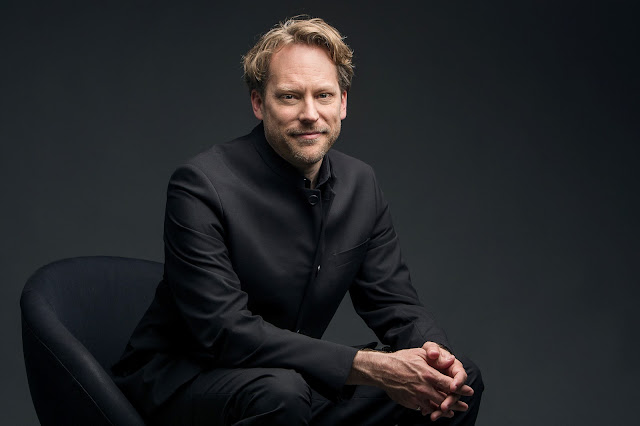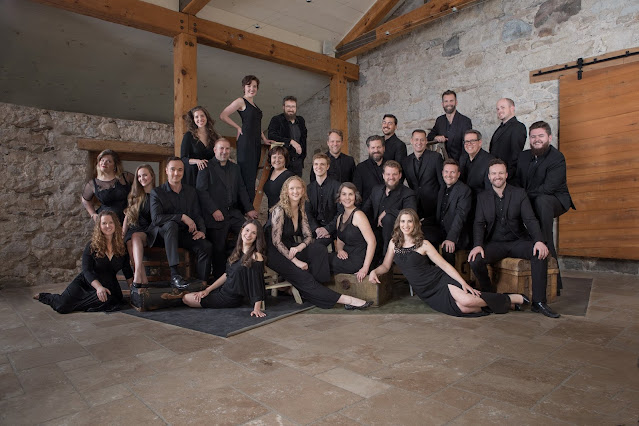 |
| Mark Vuorinen & the Elora Singers performing in the Barn at the Elora Festival |
The Elora Singers might be described as one of Canada's best kept secrets. A professional choir with a long history, dating back over 40 years, they are known in the UK for the quality of their performances without ever quite getting the sort of name recognition they deserve. They first came to my attention in 2017, when composer Patrick Hawes talked about their performances and recording of his music [see my interview] They have a fine catalogue of recordings, the most recent of which was their Christmas disc, Radiant Dawn. I recently chatted to their conductor, Mark Vuorinen (via Zoom) to learn more about the choir.
The choir is based in Elora, a town in South-West Ontario some 120 km from Toronto. This makes them unique in the Canadian cultural landscape as most professional choirs are based in the cities. Elora is a picturesque riverside town with an historic gorge. 43 years ago, The Elora Singers were formed as the choir in residence at the Elora Festival, devoted mainly to choral music and church music, with performances from the Elora Singers and visiting choirs in and around Elora. The Elora Singers is at the centre of the festival with eight to twelve concerts in three weeks, both on their own and with collaborators.
 |
| Mark Vuorinen |
The Elora Singers has evolved into a year-round ensemble with a concert series from Autumn to Spring in Elora and the surrounding cities including Toronto, Kitchener, Waterloo and Guelph. The choir is made up of freelance musicians who sing in other professional choral ensembles, and they are together full-time during July for the festival. Mark has been the choir's conductor since 2018, and though that is three or four years with the choir, two of them were in a state of 'what to do' and 'can we do choir performances differently'. 2020's festival was truncated to a three-day event, where they had recorded concerts online. This was when they recognised that their audience would pay for digital concerts, so they developed things. In 2021, there were nine concerts digitally, five with the Elora Singers and others with guest artists, groups that might not travel to Elora but could contribute digitally. The question for Mark and the choir is how much do they continue to do digitally and how much as live concert life, they need to figure out the balance.
At this year's festival, the choir's contribution includes Bach's Mass in B minor, a programme of Baltic a cappella music and two new commissions, both of which have a social element to them. Then in the Autumn, they begin their season of six to eight subscription concerts, some of which are repeated in different venues.
Mark is a relative newcomer, so the choir's core repertory is evolving. Mark is introducing new music and contemporary scores that push the boundaries of what it means to hear a choir, not just new music but varying how music is performed. But their core audience in Elora loves the more traditional 19th-century repertoire and the earlier Tudor composers, and this repertoire will not go away. So they will give the audience things they like but also challenge them. Other choirs have specific remits, such as the Tafelmusik Choir in Toronto which specialises in Early Music, whereas the Elora Singers has the freedom to explore the edges.
 |
| The Barn at the Elora Festival |
This Summer at the festival, they will be performing a new commission from Peter-Anthony Togni, Voice of the Weaver, a five-movement work which is a concerto for bass clarinet, played by Jeff Reilly (and both Reilly and Togni are from Halifax, Nova Scotia) with choral accompaniment setting at text by Mi’kmaq First Nations poet Mary Louise Martin. And this is not the first time that Togni has used this distinctive combination. The performance will be given in the choir's Summer home, the Barn, a venue seating 600. They will have the clarinettist moving through the audience, with an element of staging to create an immersive experience.
I was interested in the choir's sound, whether it might distinctively Canadian, and jokingly I talk about a stereotypical English choir. The Elora Singers is based on the tradition of singing in Canada, they have a close connection with the Anglican parish church in Elora (which is a festival venue), and you might sometimes mistake the Elora Singers for that English choir. But their commissions are important, and there are four for this year, all Canadian composers. For Mark, the choir's sound is as varied as the country. The new commissions also try to connect with things that happen in the world.
Mark mentions Canada's long and not very good relationship with the indigenous community, and this is something they seek to address. In 2019 they commissioned Barbara Assiginaak (formally Barbara Croall) a First Nations composer, who wrote Giishkaapkag (Where the Rock is Cut Through) setting her own text in her language and the premiere really positioned the choir in Canada and they plan more of the same.
The choir has always sung the music by the big names of the composers from the Baltic, and this will continue. Mark has a particular interest in the music of this area, he did his doctoral dissertation in Arvo Pärt's music. And he has been introducing music by older Baltic composers, and also newer ones as well as Baltic nationals who live in Canada. For Mark, this is not just beautiful music but there are cultural connections too. When the Baltic states were fighting for independence, singing helped them to bind them together. This is a real interest for him, but also this back story helps to connect the music to the audience.
Another premiere in July will be a new work by Timothy Corlis (a Canadian from the West coast). This is a setting of Arabic words by Kahil Gibran, and having given the digital premiere in Autumn 2021 the live premiere takes place at this Summer's festival. Also at the festival, they are collaborating with the TorQ Percussion Quartet, and three composers are writing new works for choir and percussion quartet - Melody McKiver, from the indigenous peoples, Carmen Braden, from the North West Territories, and Annika Socolofsky. They will also be recording a CD of the works with TorQ. The selection of composers is deliberate, a connection to things in the world. including touching on the work still needed to repair the government's treatment of indigenous peoples. These are difficult subjects, spoken through music, which helps them to make sense.
Mark has a teaching post as Assistant Professor of Music at Conrad Grebel University College, which is associated with Waterloo University. They are the music department for the university, which means that the scientific and engineering students take part in music, it feeds the creative part of their lives. Mark is currently head of department, as well as teaching and conducting choirs. He also conducts Grand Philharmonic Choir, a symphony chorus of over 100 singers based on Kitchener, Waterloo. On Good Friday they performed Brahms' Requiem, their first performance in two years.
Choral music has been a life-long love for Mark. As a child he was in a boys, choir, and whilst he played the piano and trumpet at university, conducting and choral music was his dream. And being able to do it all alongside his teaching is a beautiful confluence, a wonderful thing to do every day.
Never miss out on future posts by following us
The blog is free, but I'd be delighted if you were to show your appreciation by buying me a coffee.
Elsewhere on this blog
- The Earth Moves: The Tallis Scholars in Antoine Brumel and David Lang - concert review
- Samuel Barber: The Complete Songs, Dylan Perez & friends survey nearly 50 years of the composer's songs including those unpublished during his lifetime - record review
- Boulevard des Italiens: tenor Benjamin Bernheim explores Paris' long love-affair with French composers - record review
- Winds of Change: a survey of Ruth Gipps' wind chamber music from 1943 through to 1995 - record review
- A gift to a composer, to be involved in the festival in a more integral way: Helen Grime talks about being Sheffield Chamber Music Festival's first guest festival curator - interview
- An ensemble like no other: Peter Wiegold and The Third Orchestra at Grand Junction - concert review
- Crossing cultural boundaries: Britten Sinfonia placed Holst's Indian-inspired opera Sāvitri at the centre of an intriguing evening of Anglo-Indian collaborations - opera review
- Queen of Heaven: from the hypnotic to the rapturously ecstatic, Nigel Short and Tenebrae explore music written for the Virgin Mary - concert review
- Written as a companion to Brahm's Trio for Violin, Horn & Piano, William Bolcom's trio is a powerful work given a compelling performance - record review
- A fresh coat of paint: conductor Bart Van Reyn talks about his new recording of CPE Bach's oratorio Die Auferstehung und Himmelfahrt Jesu - interview
- Strong musical performances: Anthony Roth Costanzo makes his debut as Handel's Amadigi di Gaula with Boston Baroque - opera review
- Unustusse vajunud päev - A forgotten day: two Estonian performers provide an entrancing window into a Soviet Russian art-form that took place entirely outside the Soviet establishment - record review
- The intriguing tale of what came next: Steven Devine explores the music of Bach's talented pupil, Johann Ludwig Krebs - record review
- Home


.jpg)






%20Craig%20Fuller.jpg)


No comments:
Post a Comment